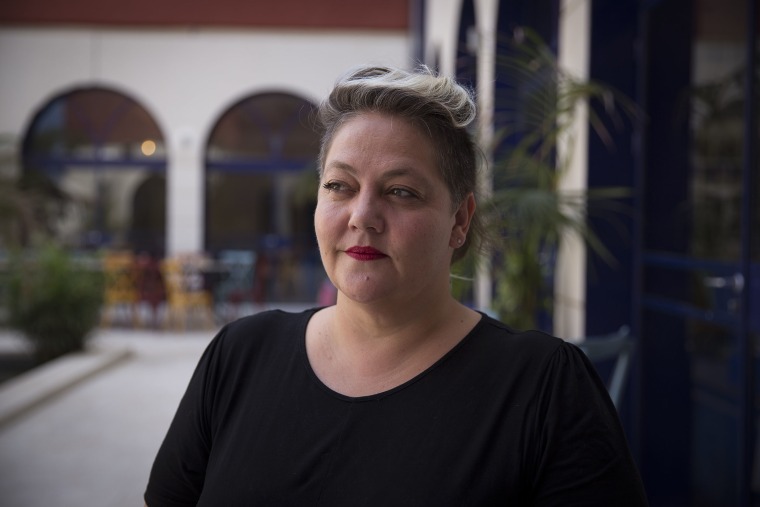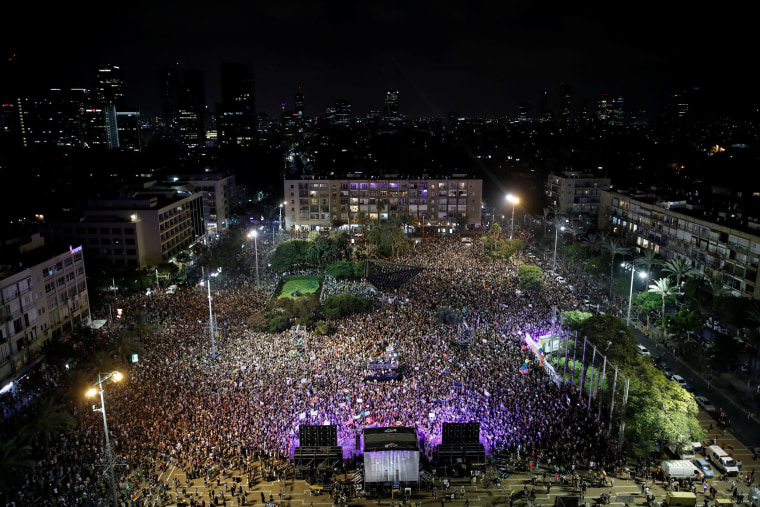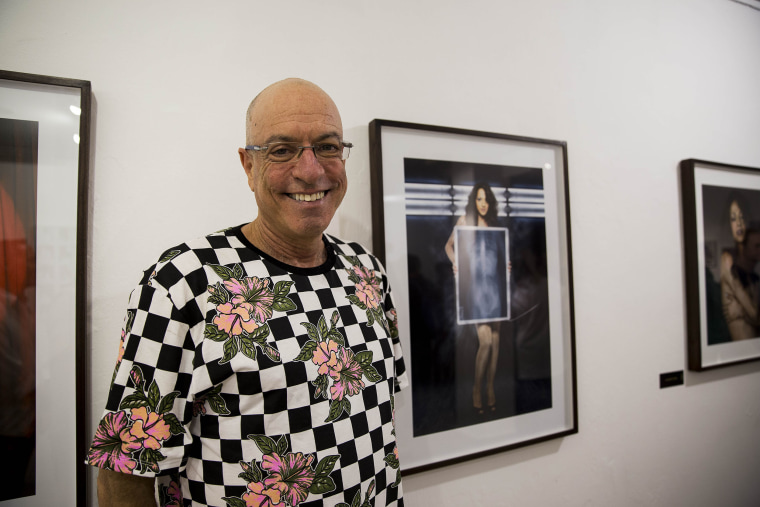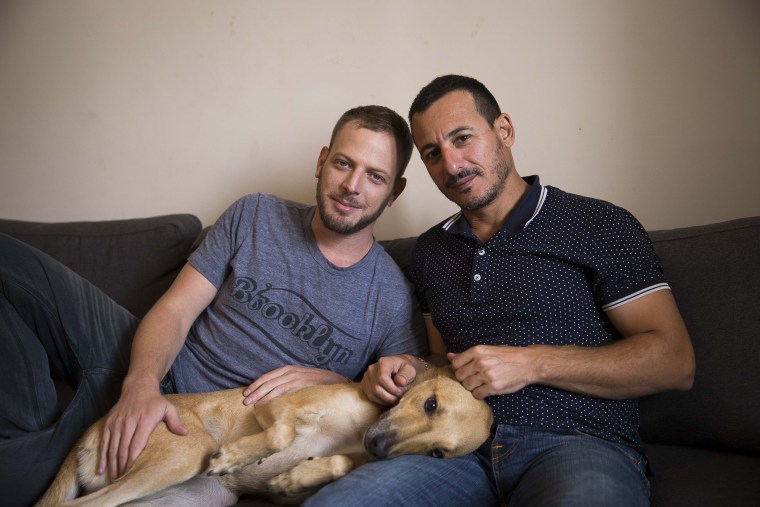TEL AVIV — Shimri Segal said it hit him during a family dinner — he didn't have children of his own. And it hurt.
“It became very difficult to sit there and watch,” Segal, a human rights lawyer, said. “To see a house full of children, and knowing that for me — I don’t want to say it is impossible. It will be very difficult.”
As a same-sex couple in Israel, Segal and his partner, Avi Buskila, have precious few options. Adoption is often a tortuous process and expensive. Another path to parenthood was blocked on July 18 when Prime Minister Benjamin Netanyahu reneged on a pledge to support a clause in a bill that would have allowed same-sex male couples to have children with surrogates.
The Israeli leader's perceived duplicity helped kick off an election drive aimed at propelling more members of the LGBTQ community into public office here. The first test of this effort will be Oct. 30 when dozens of candidates are running in Israel’s 76 municipalities and 54 regional councils.
Chen Arieli, 42, the chair of Israel’s National LGBT Task Force, is aiming to get 35 of those candidates elected. On Monday, she announced she is herself running for the Tel Aviv municipal council.
Arieli said that she is fighting for basic equality and that victories at the ballot box will help elevate the community's agenda across the country.
“According to the rabbinical court, I am not married to my wife,” she said, referring to the body that governs basic Jewish family matters. “It shouldn’t be that I’m a second-class citizen.”

She added: "We are stopping asking favors. We’re not going wait for someone official to promote our cause."
Israel is undeniably ahead of other countries in the region and the world when it comes to LGBTQ rights and inclusion.
Same-sex cohabitation is legally recognized and couples are allowed to adopt. Every year, hundreds of thousands flock to celebrate gay pride in Tel Aviv, which has become a world mecca of LGBTQ culture.
And despite his apparent U-turn, Netanyahu soon boasted that Israel’s LGBTQ community is a prime example of the country’s unique tolerance.
“I am proud to be the prime minister of one of the world’s most open and free democracies,” Netanyahu told Barbara Goldberg, the vice president of the World Congress of GLBT Jews.
“Israel consistently upholds civil equality and civil rights of all its citizens regardless of race, religion, gender or sexual orientation,” he added in the July 31 letter obtained by the newspaper Haaretz and other news organizations.
"The way is downhill now because the religious are gaining power. The road is very dark."
Still, conservative religious institutions here govern so-called life cycle events, such as birth, marriage, divorce and death, so same-sex couples cannot legally wed in Israel. Heterosexual couples who want interfaith or secular marriages — or at least ones that aren't deeply traditional — cannot get married in the country either.
Netanyahu — a security hawk seen as socially moderate — reportedly bowed to pressure from ultra-Orthodox members of his coalition government on the surrogacy issue.
Buskila, Segal and others were among the tens of thousands who poured onto the streets this summer to protest the exclusion of gay men from the surrogacy legislation.

“I’m not jealous,” Segal added, sitting alongside Buskila in their south Tel Aviv apartment. “I’m deprived.”
Buskila is the former head of anti-occupation group Peace Now, who as a young officer became famous for thwarting an attack against Palestinians in the West Bank by an Israeli soldier, and was hailed as a hero by Netanyahu.
Ronen Akerman, 55, was an officer in the Israeli military in 1980s when he was told to out gay soldiers.
"All the time they would come to me saying, ‘You need to tell us the names so we can discharge them from the army immediately,’” he said. “I needed to snitch on my cadets.”
Akerman never did, but much has changed since then. For example, Israel’s military is now among the most open and inclusive in the world.
Akerman, now a photographer who has been an LGBTQ activist for decades, has seen much of his country travel from intolerance to acceptance. And now he fears it is going backward.
He describes an Israel deeply divided between liberal Tel Aviv and the more conservative rest of the country.

“Netanyahu doesn’t care. His power is secure,” Akerman said, pointing to favorable opinion polls. “The prime minister stands in parliaments in Europe and said Israel is the most advanced country in the world in LGBT rights, and then he comes back home to Israel and then cancels laws that give us more rights.”
"The way is downhill now because the religious are gaining power,” he said. “The road is very dark.”
Overarching security challenges — like containing violence from Palestinian territories and hostility from some neighboring countries — often trump the LGBTQ community's agenda, according to Tyler Gregory, executive director of A Wider Bridge, a North American Jewish advocacy and pro-Israel group.
"The left-right political spectrum in Israel is different than most parts of the West. It is about security politics, not social and economic issues. You can have someone who supports the settlement expansion who is socially liberal," he said, referring to Jewish communities built on contested territory captured after the 1967 Six-Day War with Israel's Arab neighbors.
"For me it is all about making the investment and fighting for people outside that liberal bubble," he added.
Ashkelon is one of those places.
Ori Kaysari, 32, decided to run for municipal council in the small seaside city of 130,000 people.
She said she was propelled by a need for the community to fully accept her and her family: Her 1-year-old son, her 2-and-a-half-year-old daughter and her wife, a doctor.
Kaysari describes the tiresome bureaucracy of proving that they are a proper family. And unlike in Tel Aviv, Ashkelon has little in terms of an organized LGBTQ community.
So this summer Kaysari, a continuing education teacher, decided to hold a gay pride event — the city's first.
The mayor’s office flat-out refused to support the gathering in any way, even though it often helps other groups plan events, she said. Kaysari believes the refusal was because of pressure from Ashkelon’s significant ultra-Orthodox Jewish community. (The mayor's office did not respond to requests for comment.)
Others, she said, “get thousands of shekels, but we didn’t even get 100.”
Kaysari pressed ahead. On the day of the gay pride event, police were great, she said.
The mayor’s office, however, refused even to let the group plug in to the municipal electrical supply.

